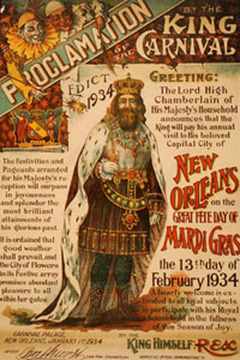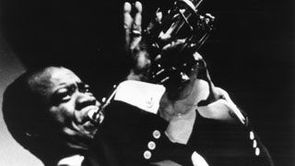Celebration of Mardi Gras

"Since 1699, Mardi Gras has been celebrated in cities worldwide. But no one does it better than New Orleans."
History of Mardi Gras;
"In 1699, French explorer Iberville and his men explored the Mississippi
River from the Gulf of Mexico. On a spot 60 miles south of the present
location of New Orleans, they set up camp on the river's Wast Bank. Knowing that the day, March 3, was
being celebrated as a major holiday in France, they christened the site Point
du Mardi Gras.
One of the first and most beloved krewes to make its appearance in the 20th
Century was Zulu. Seven years before its incorporation in
1916, this black organization poked fun at Rex. The first Zulu King ruled with a banana stalk scepter and
a lard can crown. While Rex entered the city via a Mississippi River
steamboat, Zulu used an oyster lugger to plow up the New
Basin Canal.
The new Century brought with it some difficult years. World War I canceled
Carnival in 1918-1919, but Mardi Gras survived this struggle, along with
the Prohibition of the Twenties and the Great Depression of the Thirties."
Mardi Gras been celebrated since the Middle Ages, but the celebration came from Paris to the United States.
History of Mardi Gras;
"In 1699, French explorer Iberville and his men explored the Mississippi
River from the Gulf of Mexico. On a spot 60 miles south of the present
location of New Orleans, they set up camp on the river's Wast Bank. Knowing that the day, March 3, was
being celebrated as a major holiday in France, they christened the site Point
du Mardi Gras.
One of the first and most beloved krewes to make its appearance in the 20th
Century was Zulu. Seven years before its incorporation in
1916, this black organization poked fun at Rex. The first Zulu King ruled with a banana stalk scepter and
a lard can crown. While Rex entered the city via a Mississippi River
steamboat, Zulu used an oyster lugger to plow up the New
Basin Canal.
The new Century brought with it some difficult years. World War I canceled
Carnival in 1918-1919, but Mardi Gras survived this struggle, along with
the Prohibition of the Twenties and the Great Depression of the Thirties."
Mardi Gras been celebrated since the Middle Ages, but the celebration came from Paris to the United States.
Where Jazz Was Born

"Some will say that Jazz was born in 1895, when Buddy Bolden started his first
band. Others will say 1917, when Nick LaRocca and his Original Dixieland Jazz
Band recorded the first Jazz record, "Livery Stable Blues." Ferdinand "Jelly
Roll" Morton said, "It is evidently known, beyond contradiction, that New
Orleans is the cradle of Jazz, and I myself happen to be the inventor in the
year 1902." Jazz, of course, is not an invention. It's alive. It grows, it dies,
it changes, it stays the same. Jazz is to American music what the Mississippi is
to America, and just as many rivers feed into the Mississippi, music (and
musicians) from many cultures came together in the creation of Jazz. And they
came together in perhaps the only place in the world where it could have
happened, a place where multi-culturalism was, and is, embedded in the fabric of
everyday life: New Orleans. Possibly, the earliest noted use of African rhythms
coupled with European "classical" music was "La Bomboula-Danse Negre" composed
by Louis Moreau Gottschalk in 1847. Gottschalk's father was a Jewish doctor who
moved to New Orleans from England. His mother was French and a native New
Orleanian. He grew up in the French Quarter, barely two blocks from Congo
Square, which was the center of VooDoo drumming and dancing in New Orleans."
"Jazz wasn't born on a particular day, it was created over a period of
time. It wasn't just one person or one race that was responsible for creating
it. It was a meeting, and mixing, of the essences and emotions of many people,
of many cultures. When circumstances are right and a variety of influences come
together to create something special, when many flavors combine to make a new
taste that is greater than the sum of its spices, we have a name for it down
here: we call it gumbo. And just like Jazz, nobody makes
gumbo like we make it in New Orleans"
band. Others will say 1917, when Nick LaRocca and his Original Dixieland Jazz
Band recorded the first Jazz record, "Livery Stable Blues." Ferdinand "Jelly
Roll" Morton said, "It is evidently known, beyond contradiction, that New
Orleans is the cradle of Jazz, and I myself happen to be the inventor in the
year 1902." Jazz, of course, is not an invention. It's alive. It grows, it dies,
it changes, it stays the same. Jazz is to American music what the Mississippi is
to America, and just as many rivers feed into the Mississippi, music (and
musicians) from many cultures came together in the creation of Jazz. And they
came together in perhaps the only place in the world where it could have
happened, a place where multi-culturalism was, and is, embedded in the fabric of
everyday life: New Orleans. Possibly, the earliest noted use of African rhythms
coupled with European "classical" music was "La Bomboula-Danse Negre" composed
by Louis Moreau Gottschalk in 1847. Gottschalk's father was a Jewish doctor who
moved to New Orleans from England. His mother was French and a native New
Orleanian. He grew up in the French Quarter, barely two blocks from Congo
Square, which was the center of VooDoo drumming and dancing in New Orleans."
"Jazz wasn't born on a particular day, it was created over a period of
time. It wasn't just one person or one race that was responsible for creating
it. It was a meeting, and mixing, of the essences and emotions of many people,
of many cultures. When circumstances are right and a variety of influences come
together to create something special, when many flavors combine to make a new
taste that is greater than the sum of its spices, we have a name for it down
here: we call it gumbo. And just like Jazz, nobody makes
gumbo like we make it in New Orleans"
New Orleans Jazz Fest
"The New Orleans Jazz & Heritage Festival is the celebration of the unique culture and heritage of New Orleans and
Louisiana. Featuring an endless amount of music, succulent local and regional
delicacies, one-of-a-kind handmade arts and crafts, second line parades and so
much more – there is something for everyone at Jazz Fest!"
Over the years Jazz Fest has received many honors, including being named the Festival of the Year four times by Pollstar magazine.
With 12 stages of soul-stirring music-- jazz, gospel, Cajun, zydeco, blues, R&B, rock, funk, African, Latin, Caribbean, folk, and much more.
Louisiana. Featuring an endless amount of music, succulent local and regional
delicacies, one-of-a-kind handmade arts and crafts, second line parades and so
much more – there is something for everyone at Jazz Fest!"
Over the years Jazz Fest has received many honors, including being named the Festival of the Year four times by Pollstar magazine.
With 12 stages of soul-stirring music-- jazz, gospel, Cajun, zydeco, blues, R&B, rock, funk, African, Latin, Caribbean, folk, and much more.
Architecture
"In New Orleans, old homes are architectural treasures. Take a leisurely walk
through one of the city's unique neighborhoods and find a myriad of styles,
including"
Creole Cottage
(1790-1850)
American Townhouse
(1820-1850)
Creole Townhouse
(1788-mid-1800s)
Raised Center-Hall Cottage or Villa
(1803-1870)
Shotgun House
(1850-1910)
Double-Gallery House
(1820-1850)
through one of the city's unique neighborhoods and find a myriad of styles,
including"
Creole Cottage
(1790-1850)
American Townhouse
(1820-1850)
Creole Townhouse
(1788-mid-1800s)
Raised Center-Hall Cottage or Villa
(1803-1870)
Shotgun House
(1850-1910)
Double-Gallery House
(1820-1850)
http://www.neworleansonline.com/neworleans/history/
where to go to get more info about New Orleans....
where to go to get more info about New Orleans....
